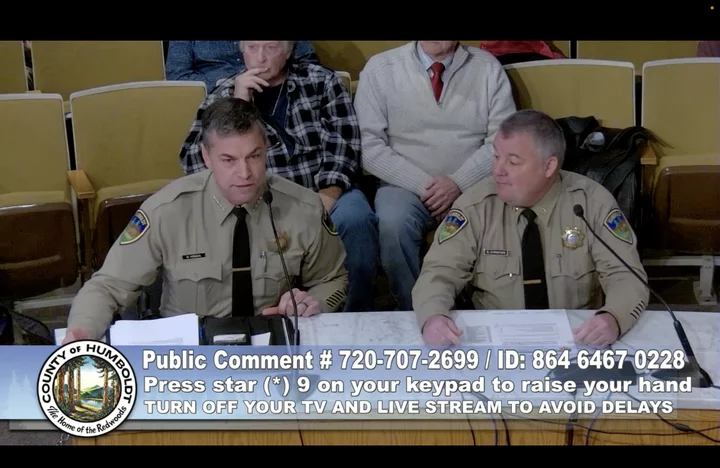A spokesperson for Centro del Pueblo addresses the board at Tuesday’s meeting as supporters hold a “Know your rights” banner. | Screenshot.
###
The Humboldt County Board of Supervisors received a “dismal” mid-year budget update at today’s meeting, with staff reporting that the county’s General Fund remains on track to run out of money by the end of the 2025-26 fiscal year.
County finances have been following this concerning trajectory for more than a year, with a $15.1 million deficit built into the current year’s budget, but Deputy County Administrative Officer Jessica Maciel had more bad news to share today. She reported that tax revenues are lower than expected, and many of the county’s “major” funds are deep in the red, “which is concerning and problematic for us,” she said.
Funds with big negative balances include those for the Department of Health and Human Services (at minus $8.6 million), Roads (minus $7.2 million) and Aviation (minus $2.8 million).
At the start of the current fiscal year the General Fund had a balance of roughly $43.2 million, with an operating budget of just over $600 million. By the end of this fiscal year, on June 30, the balance is expected to be less than half of that amount, at roughly $21.1 million.
With tax revenues flagging while the cost of salaries, benefits (especially health insurance) and pensions only rise, the outlook is bleak. Looking ahead to next year’s budget, Maciel said, “It’s really difficult to make recommendations that balance the fiscal needs of the organization but allow departments to maintain operations.”
County Administrative Officer Elishia Hayes recommended that the board deny any requests for un-budgeted General Fund expenses, but Sheriff Billy Honsal asked for them to leave some wiggle room.
“I would love to have the opportunity to present new ideas to this board, and even if you have a limited amount of funds I think it should be up to the board … to prioritize how you want to spend your General Fund money,” Honsal said. He later added that every single county department is “cut to its core.”
However, Hayes said that with “real challenges” looming in the 2026-27 fiscal year, it’s important to tighten the purse strings now.
“It would be incredibly irresponsible of me to hand you a checkbook when you don’t have money in your checking account, and that’s what the data is telling us right now,” she said. “You’re not going to have money in your checking account at the end of next fiscal year, based off of a status quo budget as it is.”
With Third District Supervisor Mike Wilson absent (he had to leave the meeting early), the remaining board members unanimously approved staff a recommendation directing Hayes to prepare the 2025-26 budget with a number of cost-saving provisions, including the de-allocation of unfunded positions and setting the General Fund allocations at a “status quo” level.
Sheriff Billy Honsal (left) and Corrections Captain Duane Christian address the board. | Screenshot.
Immigration Enforcement Concerns
Earlier, during the morning session of the meeting, the board chamber was filled with members of the local immigrant community and their supporters, who were looking for reassurance that the Sheriff’s Office and other county officials won’t paricipate in the Trump administration’s immigration crackdown, which has included shipping migrant detainees to Guantanamo Bay, removing legal protections for political refugees and redirecting military resources to help enact mass deportations.
Ever since 2018, when local voters passed Measure K (the “Humboldt County Sanctuary Ordinance”), Sheriff Honsal has delivered semi-annual public reports to the Board of Supervisors to disclose any and all information that his office has provided to U.S. Immigration and Customs Enforcement (ICE), if any.
Of course, Measure K — like statewide legislation such as Senate Bill 54 — prevents local law enforcement agencies from using their resources to assist federal immigration enforcement agencies, so Honsal’s reports have been fairly minimal. And today he reiterated his commitment to report to ICE only what he’s legally obligated to.
He explained that whenever someone’s booked into the county jail, their fingerprints are processed and automatically sent to the Department of Homeland Security and ICE. The latter agency may send a “hold request” to the county, asking jail staff to maintain custody of someone who’s been flagged as being undocumented, but Honsal said, “We do not honor those holds” as a general policy.
Captain Duane Christian, who’s in charge of the county correctional facility, said there can be exceptions when an undocumented person has been convicted of a “qualifying offense” under California Government Code 7282.5. In those cases, the detainees are eligible to be turned over to ICE. But Christian said that hasn’t happened over the past year.
He ran down the stats. Out of roughly 6,500 people booked into the jail last year, ICE sent back 33 administrative detainers, asking the county to hold onto those inmates. “We do not honor those detainers,” Christian reiterated. He said there were four individuals who, in theory, the Sheriff’s Office could have transferred to ICE upon their release from jail.
“But we cannot hold them in custody past the release date for ICE to come pick them up or anything like that,” he said. “Of those [four] people, none of them were released to ICE.”
During the public comment period, people expressed heightened anxiety in the current political climate. A woman who called in and described herself as a 32-year county resident asked county officials to help ensure that “public places such as schools and hospitals … will continue to be places that we shouldn’t have to worry about going out of fear.”
A woman speaking on behalf of the local immigrant rights group Centro del Pueblo came to the lectern flanked by supporters holding a “Know your rights” banner behind her. She presented a letter asking the board to “reiterate and contextualize the end of any type of collaboration with ICE” and to implement a zero-tolerance policy for anti-immigrant discrimination in policing.
A group of senior women known as the Raging Grannies sang a song of support for immigrants and their contributions to the community, to the tune of “You Are My Sunshine.”
Speaker after speaker voiced support for the immigrants in our community, past and present. One woman noted how many headstones in the Ferndale Cemetery proudly list the deceased’s country of origin and said, “Ferndale wouldn’t be our Victorian town without immigrants.”
A young Latina and DACA (Deferred Action for Childhood Arrivals) recipient asked everyone watching the meeting, “Please look at me.”
She continued, “I am the people who this organized [federal] government does not want to help or protect. I am the person that every time negative remarks are made about sanctuary law, who you are limiting their rights to. I am one of many youth members asking you to please expand sanctuary law into Eureka and allow us to feel the same safety I felt when I first arrived here in 2018 to get my education.”
(Supervisor Wilson later clarified that the county has no jurisdiction over actions by the City of Eureka.)
Mary Ann Hytken, program leader for the nonprofit English Express, which offers English language lessons, citizenship classes and more to local immigrants, said, “This is the backbone of Humboldt County. This is our economy. Immigrants are here working, building, caring and contributing in ways too numerous to share here today.”
Wilson followed up on that argument, saying, “The data is very clear that crime and incarceration rates for immigrant populations is significantly less, and in some cases half as much as [the] incarceration and crime rates for people born in the United States.” He added that immigrant communities contribute more than $1.5 trillion to the nation’s economy.
Later in the meeting, Jim Glover of the county’s Human Rights Commission presented the board with a draft letter [pdf here] expressing support for “all Humboldt County community members” and asked the board to sign it. After some minor wordsmithing — and the addition of a provision asking Sheriff Honsal and District Attorney Stacey Eads to add their signatures — the board unanimously agreed to do so.
Airplane Hangar Rates to Increase
The cost of storing your plane at a Humboldt County airport will so go up, much to the frustration of local general aviation pilots, who say the county needs to improve the condition of its facilities before jacking up rents.
The county has been without an aviation director since the unexpected and still-unexplained departure of Cody Roggatz in September, so today’s report was left to Karen Clower, assistant county administrative officer and acting aviation director. She recounted the events leading to these rate increases, including a negotiated agreement with the Federal Aviation Administration, which previously sued the county and slapped it with a notice of deficiency for being out of compliance with federal regulations.
Per that agreement the county agreed to incrementally increase aeronautical tenant hangar rates by 18% each year for five years until hanger rates reach the rates approved by both the FAA and the Aviation Management Consulting Group (AMCG), a firm retained by the county to conduct a rate study. The county is now entering Year Five of that period, and so the board was asked to approve the rate increase — possibly with an additional amount connected to the consumer price index.
Clower warned that if the board decided not to increase rates in compliance with that agreement, the county would risk losing up to $1.2 million in entitlements and grant funding.
As in previous meetings where this issue has been discussed, a succession of local pilots voiced their objections to the proposed rate hikes, with many questioning the methodology of the AMCG rate study. They said steep rate increases would harm the economy and impact their livelihoods.
First District Supervisor Rex Bohn acknowledged that delayed maintenance at the airports has been “a constant issue” in his 13 years on the board. Fifth District Supervisor Steve Madrone said this was not an easy decision to make, saying the county needs to improve its aviation facilities but also needs revenues to do so.
Ultimately the board voted 4-1, with Bohn dissenting, to have staff return with an ordinance increasing hangar fees to the FAA-approved level, though without an additional CPI increase. The motion included a General Fund contribution of $55,876 to compensate for the resulting lost revenue.
Clower said it is staff’s intention to use those funds for hangar improvements.


CLICK TO MANAGE